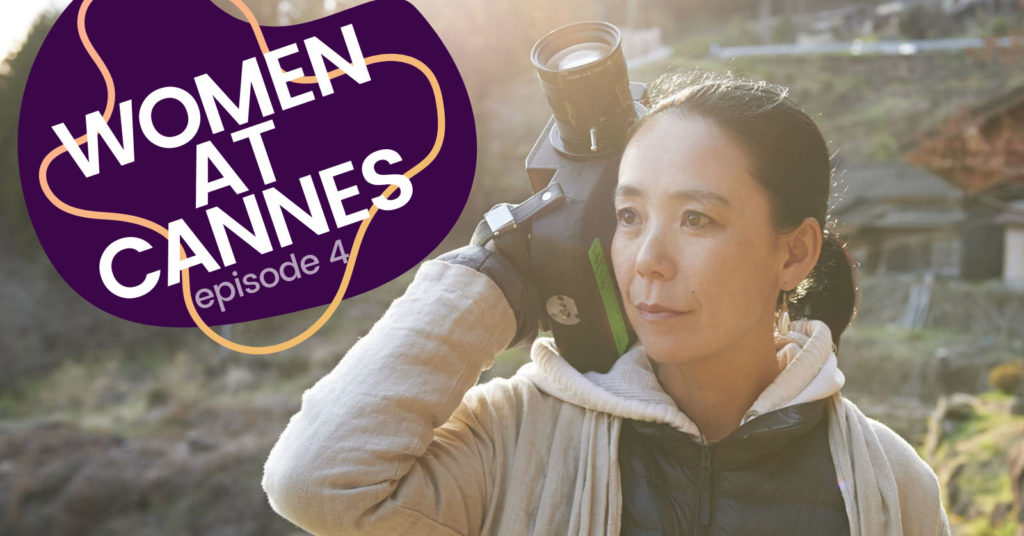On today’s episode of the podcast, we discuss Japanese filmmaker Naomi Kawase who has been programmed at the Cannes Film Festival more than almost any other director this century, and why she’s one of the best and most under-appreciated filmmakers.


Listen to the whole season on Women at Cannes
Today’s podcast episode on Naomi Kawase is the fourth episode of this season celebrating achievements of women directors at the Cannes Film Festival in Competition and beyond. Tune in next week for our final surprise episode in which we look back at Cannes 2022.
Episode 4 of the Women at Cannes podcast season: Naomi Kawase at Cannes
This episode of the podcast on Naomi Kawase features Editor-in-Chief Alex Heeney, Executive Editor Orla Smith, Associate Editor Brett Pardy, and special guest Milly Gribben.
In this episode of the podcast, we discuss why we think Naomi Kawase is an important filmmaker. We also dig into her fraught history of Cannes premieres and the misogynistic press coverage they’ve invited.
Naomi Kawase won the Camera d’Or (prize for best first feature) at Cannes in 1997 for Suzaku, and she has screened films at the Cannes Film Festival numerous times. She is the third most programmed filmmaker at Cannes this century, just behind the Dardenne brothers and Ken Loach, and tied for 6 times with Nuri Bilge Ceylan and Paolo Sorrentino.
Nevertheless, as we discuss on the podcast, Naomi Kawase’s films have often been met by critics with ridicule. On the podcast, we especially discuss the reception for Naomi Kawase’s 2014 Palme d’Or contender Still the Water, which was roundly mocked for “trying too hard to be poetic”, and Sweet Bean (2015), which screened in Un Certain Regard, IndieWire published a misogynistic hit piece called “Why does the Cannes Film Festival keep programming Naomi Kawase?”.
In our opinion, regularly programming Kawase is one of the few things Cannes gets right. Her films are incredibly thoughtful, empathetic, and rich character studies that are equally visually and aurally stunning.
On the podcast, we discuss Naomi Kawase’s treatment by the (largely white and male) critical establishment over the decades, who often downplay her image-making skill and dismiss the subjects (women) she chooses to centre her films on, is an instructive case study on misogyny in the film industry.
On this episode of the podcast: Naomi Kawase at Cannes
- Intro (0:00)
- Who is Naomi Kawase? (11:45)
- Our introductions to Naomi Kawase (15:57)
- The themes in Naomi Kawase’s films (26:00)
- Sound and sense of place in Kawase’s films (47:15)
- Why are men so mad at Naomi Kawase? (51:48)
- Why Cannes hasn’t always been the best launchpad for Naomi Kawase (1:04:50)
- Closing thoughts (1:07:47)
Stay updated about the Women at Cannes season and more
The Naomi Kawase episode is just one of five in our podcast season on Women at Cannes.
Sign up to get updates in your inbox on the Women at Cannes season, streaming recommendations for films by women at Cannes in past years, and more.
Show Notes
- View the history of women directors at Cannes
- Watch Naomi Kawase’s TED Talk on her approach to cinema
- Read Lindsay Pugh’s review of Sweet Bean on her website Woman in Revolt
- Read Linsay’s interview with Sweet Bean actress Kirin Kiki
- Read Alex’s profile interview with Agnieszka Holland
- Read Orla’s interview with Ammonite director Francis Lee
Related Episodes
- Women at Cannes Ep. 1: A podcast on the history of women directors at Cannes
- Women at Cannes Ep. 2: Kelly Reichardt at Cannes 2022
- Women at Cannes Ep. 3: Céline Sciamma at Cannes
- Ep. 80: The Babadook and Prevenge: Motherhood in horror (Members Only)
- Bonus 16: Watching Lena Dunham’s Girls in 2021 (Members Only)

